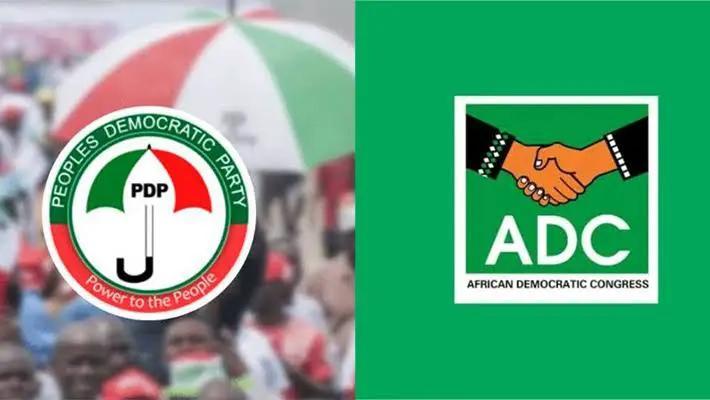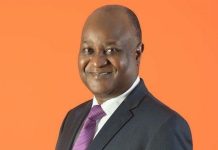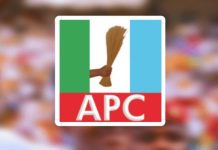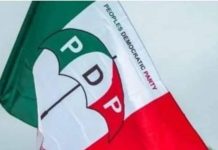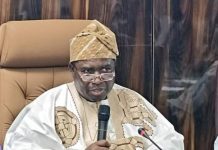By Abba Hamisu Sani
Africa-Press – Nigeria. With the emergence of the African Democratic Congress (ADC) as a coalition platform with prominent politicians like former Vice President Atiku Abubakar, Peter Obi, the Labour Party presidential candidate in the 2023 election, former governors of Kaduna State Nasir El-Rufai, Rotimi Amaechi of Rivers State, Rauf Aregbesola of Osun State, former Senate President David Mark, and former ministers, many spectators see it as a formidable opposition capable of dislodging the People’s Democratic Party (PDP) from its position as the major opposition party.
From 2015 to early 2025, the PDP stood as the main opposition to the ruling All Progressives Congress (APC) despite its internal crises.
The PDP’s inability to perform its function is attributed to the influence of its members, such as the former governor of Rivers State and current Federal Capital Territory Minister, Nyesom Wike.
For the ADC to be different from the People’s Democratic Party, the coalition has to take conscious and deliberate steps towards committing class suicide—substituting the personal interests of high-ranking politicians like Atiku, Peter Obi, and Amaechi. It must demonstrate in its political organization the principles of morality, the rule of law, and absolute fidelity to the intent, spirit, and letters of the constitution, which must be entrenched and operationalized in the party’s internal processes.
Unlike the old order, the structure of the ADC should be organized around economic interest groups in their places of residence, away from ethnicity and religion in the members’ places of origin.
This will signal a paradigm shift from identity politics to liberal democratic politics and substitute patronage with good governance as the reward system for political participation. Because political outcomes depend a lot on input and process, the ADC would hold the prospect of repositioning Nigeria on the path of freedom from a deep and endemic culture of corruption that has ravaged the country like a cancerous virus, preventing the state from providing security and welfare for its citizens.
PDP: The Enduring Opposition
The recently conducted by-elections by the Independent National Electoral Commission (INEC) in 16 constituencies indicated that the PDP quietly affirmed its position as the major opposition, even amid internal fractures and defections. Victories in the Ibadan North Federal Constituency and Onitsha North 1 State Constituency were reminders that the party’s historic grassroots roots still matter.
Some political spectators point out that Atiku’s over six million votes in the last presidential election were more reflective of the PDP’s enduring network than his personal political appeal. The by-elections underscored this point.
Despite Atiku’s influence, his pivot into the ADC experiment failed to sway voters, even in his home state.
This can be used to affirm the PDP’s position as the main opposition and dispel the possibility of the ADC taking over.
ADC’s Chances of Displacing PDP as the Main Opposition Seem Slim
The biggest storyline of the by-election was the ADC’s performance—or lack thereof—as the party struggled to become the major opposition to the ruling APC.
Formed as a platform of opposition leaders united by a common goal of unseating President Bola Tinubu in 2027, the ADC entered the by-elections with the hope of testing its popularity. From Adamawa to Anambra, ADC candidates fared poorly, raising questions about whether a hurried coalition built on shared frustrations with the ruling party can withstand Nigeria’s complex political terrain.
Umar Muhammed, a political analyst, said the PDP still maintained its position as the main opposition in Nigeria despite the ADC coalition, which many expected to replace the PDP considering the calibre of politicians that form its composition.
“The People’s Democratic Party (PDP) still enjoys grassroots structure, but the ADC is yet to have that established presence in the 774 local government areas in the country. At the same time, it will not be easy to displace the PDP in the minds of Nigerians, considering the fact that it is the first political umbrella that fought against military dictatorship,” Umar said.
The analyst added that removing the PDP from the Nigerian political space is not a short-term project. It needs hard work, seriousness, and sincere purpose—not just mere self or individual interests.
“The APC, as an opposition party in those days when the PDP was in power, was lucky to have governors, National Assembly members, and former President Buhari, who had huge northern patronage, along with current President Bola Tinubu, who had control of South-West politics as the strongest icons of the party. These reasons played a critical role in the popularity of the APC, unlike the ADC, which many consider a platform of frustrated politicians who were denied opportunities in their respective former political parties,” he stressed.
Tinubu as a Political Tactician Will Hardly Allow ADC to Breathe
Dayyabu Baba Nguru, a political and public affairs analyst, described Tinubu as the single Nigerian politician who understands politics from different angles. The former Lagos State governor fought former Nigerian President Olusegun Obasanjo’s strategy of making Nigeria a one-party nation. He resisted converting from his then party, the Alliance for Democracy, to the PDP as his counterparts from the South-West did. Instead, he registered a new political party, the Action Congress, which he used to maintain the Lagos State governorship.
He kept managing the party until the coalition with other political parties to form the ruling APC.
“With this type of politician as the president seeking a second term, do you expect the ADC to function and climb to the position of the main opposition?” he stated.
Considering the critical role oppositions perform in a democratic system, there is a need for the PDP, which still has a wider network, to be serious by fixing its internal crisis and performing the real duties of opposition.
As the 2027 elections approach, the need for strong opposition cannot be overemphasized, as it will contribute to checkmating the excesses of the ruling APC and also provide alternatives for Nigerians to try other ideologies.
For More News And Analysis About Nigeria Follow Africa-Press


